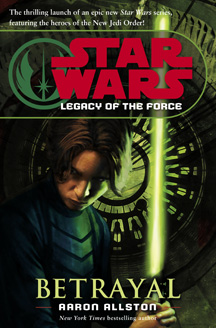I wasn’t a huge fan of the nine-book “Legacy of the Force” series on my first read, not because of the quality of the writing – Aaron Alliston and Karen Traviss are my two favorite “Star Wars” authors, and Troy Denning is solid – but because of what happens. When Jacen Solo kills fellow Jedi Nelani at the end of “Betrayal” (2006), I probably said “You idiot” out loud. I have a low sympathy threshold for good guys who commit evil acts, no matter their rationale.
Also, the real-world timing was not friendly to “Legacy of the Force.” We had just seen Anakin Skywalker complete his fall in “Revenge of the Sith” one year earlier, and we had seen somewhat of a civil war in the “Dark Nest” trilogy; a civil war between the Corellian system and the Galactic Alliance serves as the centerpiece of “LOTF.”
On this re-read, though, I’m absorbing not so much what happens, but more so why and how it happens, and that makes me more open to the story of Jacen’s transformation into Darth Caedus. In this first book, Allston has already distinguished Jacen from Anakin Skywalker. Even though their ultimate reasons for doing evil acts are the same (to protect their loved ones and to impose a vaguely defined “order” where there would otherwise be endless war), the fact that Anakin is driven to those acts through pure emotion and Jacen does so through (twisted) logic makes it different enough.
Jacen’s story also looks a lot better in light of fans comparing Kylo Ren’s “The Force Awakens” arc to Jacen’s in “LOTF,” and suggesting that the screenwriters might have even borrowed from it. Although both characters are from the Solo family trees of their respective continuities, Ren’s story, at least so far, doesn’t come close to the detail of Jacen’s (or even Anakin’s). I suppose it’s possible that could change, but we got just one little context-free, chronologically out-of-order slice of it in “Episode VII,” as Ren kills his father for the same reason Anakin kills younglings: It will give him dark-side power.
Jacen doesn’t kill people just because it will give him dark-side power. When he kills Nelani (whom I mistakenly remembered as Danni Quee, who isn’t in this book at all), it’s because he has visions of the future where her survival means the galactic civil war will become even bloodier – and what’s more, Jacen will kill Luke. Rather than getting a lone vision – like Luke does when he cuts his training short on Dagobah – Jacen takes his time, going through all possible futures in his mind. Only then does he decide he must kill Nelani, and there is no anger in his action. I reject his action entirely, but I can understand his point of view, and that already makes him a more interesting villain than Ren or even Anakin.
Interestingly, Luke spells out the problem with Jacen’s philosophy in a chat with his nephew early in “Betrayal,” noting that individual evil actions might seem logical for the sake of the greater good, but before long, that series of evil actions leads to a philosophy of evil. With an arrogance borne of his resistance to pain (“Traitor”) and his knowledge of various Force philosophies (learned in the five years between “NJO” and “Dark Nest”), Jacen doesn’t hear or heed Luke’s warning. The arrogance isn’t unfounded, as he is indeed more knowledgeable about the Force than, say, Anakin or Kylo Ren. However, it’s easier for a reader to see from the outside that he’s crossed that evil line than it is from the inside, where Jacen rationalizes everything.
The other thematic element of “Betrayal” that bothered me from a “what” perspective but which I find fascinating from a “how and why” perspective is the galaxy’s descent into civil war between the Galactic Alliance and the Corellians. The Corellians owe money to the GA for the reconstruction after the Vong war, but they declare their independence. Both sides (as outlined at a heated Skywalker/Solo dinner-table discussion) have fair arguments: Corellia should be independent if it wants to, but it shouldn’t back out of its financial agreements.
Despite some early bad decisions, such as the GA kidnapping Corellian Rebel Alliance hero Wedge, full-scale war is on the path to being diplomatically avoided until a deadly attack on the negotiation meetings. At several points in “Betrayal,” family and friends find themselves on opposite sides of the war – Wedge on the Corellian side, his daughter on the GA side; Han on the Corellian side, Jaina on the GA side – as Allston doubles-down on Denning’s civil war in “Dark Nest” when the Solos and Jag Fel exchange laser fire. The Clone Wars were also in this vein, but those stories tempered the theme by not letting us get to know too many of the Separatists and by having the Seps use droid armies.
While Leia is troubled that the galaxy has broken out in a war where “Both sides … are us,” a GA admiral notes that “In my experience, it doesn’t take long for ‘us’ to become ‘them.’ And when that happens, every savagery becomes possible.”
In a way, “Betrayal’s” “villain” is the inertia of anger and spite, but of course, those flames ignite into war when fanned by powerful beings, and “Legacy of the Force” is bursting with great villains, even beyond Jacen. Thrackan Sal-Solo, introduced in “The Corellian Trilogy” and nurtured in “NJO,” is leading the push for Corellian independence for the sake of his own military power. Everything he says is incendiary, and he sees military men – even heroes like Wedge – as underlings to be threatened until they do his bidding; his power-mongering rhetoric particularly made me think of Donald Trump’s presidential campaign on this re-read.
The third villain is the coolest of all. For one thing, it’s awesome that Del Rey brings back Lumiya, the Dark Lady of the Sith who was last seen in the Marvel comics two decades earlier; this is the final nail in the coffin of the predominant philosophy of the 1990s Bantam era that the Marvel comics should be ignored. I always felt that Mara Jade was a bit of a replacement for Shira Brie/Lumiya, and Lumiya even tells Ben Skywalker that her backstory isn’t so different from his mom’s. At this point, Lumiya and Mara work as perfect foils for each other. For another thing, I love the way Allston teases the return of this character from the past, first through the intriguingly decipherable pseudonym Brisha Syo and then through allusions to her past relations with Darth Vader and Luke Skywalker.
In “Betrayal,” Lumiya lures Jacen with a continuation of Vergere’s philosophy that there is no light and dark side, only right and wrong actions by individuals. Lumiya lives on an asteroid that is the former habitat of Darth Vectivus, a Sith lord who didn’t do evil. Some readers feel that Lumiya’s recasting of Vergere as a practitioner of Sith arts is a retcon from “Traitor,” but I see it as merely differing terminology. I like how Lumiya doesn’t use mind tricks – the Force-adept Jacen can’t sense them, and even Nelani admits Lumiya is not using the Force to influence Jacen – she simply wins him over by appealing to his own sense of logic and rightness.
I’m not quite as thrilled with the “predestined” aspects of “Legacy of the Force”: the idea that Lumiya links up with Jacen because it’s his fate to become a Sith lord, or Luke’s sense of a threat from “a man who doesn’t exist” (the future Jacen, as is obvious on this re-read). Predestined and prophetic stories, of which the prequel trilogy is also one, can tend to operate on a loop of internal logic that discourages a storyteller from acknowledging other possible story paths.
Although some of Allston’s action scenes are overlong, he generally brings his A-game to “Betrayal,” telling a foreboding gearing-up-for-war yarn with a nice mystery that leads Jacen to Lumiya, but also peppering in some comedy. For example, Jaina runs into Wedge and Tycho and asks if she’s stumbled upon a veterans’ parade, and when Jacen asks for the name of the dark lord supposedly in the basement of her home, Lumiya says “Darth something.”
“Legacy of the Force” is, on the surface, just another story of a Jedi falling to the dark side. But it’s clear from book one it aims to take Jacen down this familiar path in the most layered and detailed – and disturbingly relatable – way we’ve seen so far.


